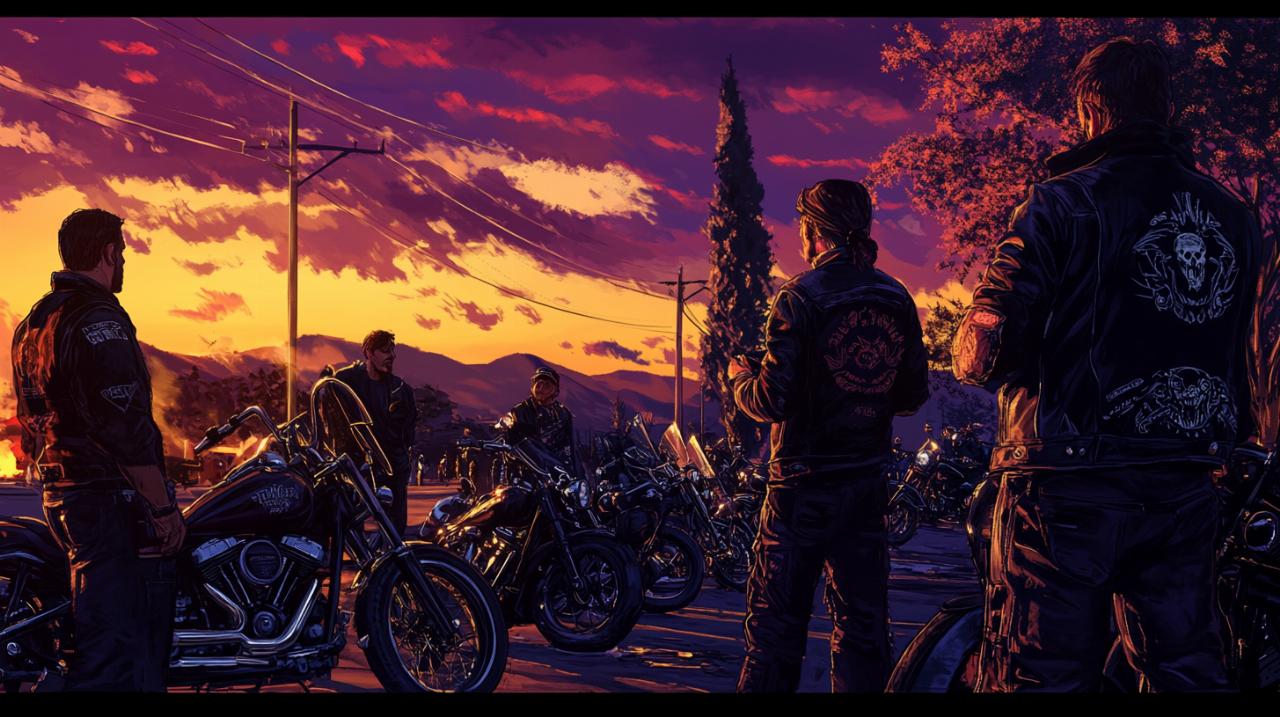The gritty world of Sons of Anarchy captivated audiences for seven seasons on the FX network, weaving a complex narrative about loyalty, family, and the brutal realities of life within an outlaw motorcycle club. Created by Kurt Sutter, this crime drama delivered more than just high-octane action and violence; it offered profound philosophical musings wrapped in the leather-clad persona of its characters. The dialogue resonated deeply with viewers, earning the series a user score of 7.9 out of 10 based on hundreds of votes, and cementing its place as a cultural phenomenon that continues to inspire discussion long after its conclusion.
The Raw Reality of the Outlaw Lifestyle
Embracing the anti-hero identity
One of the most striking aspects of Sons of Anarchy lies in its unflinching examination of how society perceives those who operate outside conventional boundaries. The series never shied away from presenting its protagonists as deeply flawed individuals whose actions often crossed moral lines. A particularly memorable observation from the show reminds viewers that the motorcycle club members were not perceived as romantic rebels or misunderstood antiheroes, but rather as dangerous criminals who society feared. This stark acknowledgment of their reputation as essentially serial killers forced both characters and audience to confront uncomfortable truths about the nature of their chosen lifestyle. The show's willingness to embrace this darkness without romanticising it created a level of authenticity that set it apart from other crime dramas of its era.
Confronting society's perception of bikers
Throughout its run, the series explored how the outside world viewed the Sons and similar organisations. The tension between the club's internal code of honour and the external perception of them as violent outlaws created a constant narrative friction. Characters frequently grappled with this dichotomy, recognising that whilst they saw themselves as bound by loyalty and brotherhood, the rest of society saw only the violence and criminality. This thematic exploration extended beyond simple misunderstanding, delving into questions about whether such perceptions were entirely unjustified or if the club's actions had earned their fearsome reputation. The show's nuanced approach to this question prevented easy answers, forcing viewers to consider the complex relationship between identity, action, and consequence.
Releasing the Chains of Yesterday
Why Clinging to the Past Destroys the Present
Among the most resonant themes woven throughout Sons of Anarchy was the destructive nature of living anchored to past events. The series repeatedly emphasised through its characters that remaining trapped by previous decisions, traumas, and relationships prevented any possibility of growth or redemption. This philosophy manifested in various storylines where characters found themselves unable to move forward because they remained entangled in old grievances, lost loves, or previous mistakes. The wisdom of releasing these burdens and embracing forward momentum became a recurring message, though one that proved extraordinarily difficult for most characters to implement. The show demonstrated that whilst the past inevitably shapes who we become, allowing it to dominate the present leads only to stagnation and repeated suffering.
Finding strength in forward motion
The series illustrated that genuine strength came not from denying the past but from learning to carry its lessons without being crushed by its weight. Characters who managed to embrace this philosophy, however imperfectly, often found themselves better equipped to handle the constant challenges their lifestyle presented. This forward-looking perspective became particularly crucial as the narrative progressed and characters faced increasingly difficult choices about the future direction of the club and their own lives. The show suggested that breaking free from cyclical patterns of violence and revenge required a conscious decision to prioritise the future over endless retaliation for past wrongs, though achieving this remained one of the most difficult challenges any character faced.
Brotherhood beyond bloodlines
Chosen Families and the Bonds That Define Us
Perhaps no theme proved more central to Sons of Anarchy than the concept of family transcending biological connection. The series repeatedly reinforced the notion that true family consists of those individuals we consciously choose to include in our lives, rather than simply those to whom we are related by blood. As platforms like Escuchar Radio and various blogs about philosophy have noted, this exploration of chosen family versus biological family represented one of the show's most powerful emotional cores. The motorcycle club itself functioned as an alternative family structure, with members referring to each other as brothers and treating club bonds as sacred commitments that often superseded traditional family obligations. This reimagining of family allowed the show to explore questions of loyalty, belonging, and identity in ways that resonated with audiences who understood that the most meaningful relationships are not always those we are born into.
Loyalty through choice rather than obligation
The distinction between loyalty born from obligation and loyalty chosen freely became a crucial thematic element throughout the series. Characters who remained with the club purely because they felt trapped by circumstance or tradition often found themselves conflicted and ultimately destructive. In contrast, those who actively chose their commitment to the brotherhood, understanding its costs and challenges, typically demonstrated a deeper and more resilient loyalty. This examination of voluntary versus obligatory bonds extended to romantic relationships, parental connections, and friendships throughout the show. The series suggested that the strongest ties are those we forge consciously, with full awareness of what we are committing to, rather than those imposed upon us by accident of birth or circumstance.
Moral compromises and dangerous bargains
When ambition demands unholy alliances
Sons of Anarchy excelled at portraying the morally grey territory its characters inhabited, particularly when ambition or necessity forced them into uncomfortable alliances. The show acknowledged that achieving certain goals sometimes required making agreements with individuals or organisations that contradicted the club's stated values or personal moral codes. This realistic portrayal of compromise avoided simplistic moralising, instead presenting these deals as inevitable consequences of operating in a world where ideological purity was a luxury few could afford. Characters frequently found themselves partnering with rivals, law enforcement, or criminal organisations they despised, all in service of what they perceived as greater goods or necessary evils. These storylines forced viewers to consider difficult questions about whether ends can justify means and at what point compromise becomes capitulation.
The Cost of Making Deals with Darkness
Whilst the series acknowledged the occasional necessity of morally questionable alliances, it never allowed characters to escape the consequences of such choices. Each deal made with metaphorical or literal devils exacted a price, often one far higher than initially anticipated. The show meticulously traced how these compromises accumulated over time, creating debts that eventually demanded payment in blood, loyalty, or soul. This unflinching examination of consequence distinguished Sons of Anarchy from programmes that allowed protagonists to engage in morally dubious behaviour without facing meaningful repercussions. The series insisted that every choice mattered and every deal carried weight, creating a narrative where characters' past decisions haunted them with relentless consistency.
The true essence of brotherhood over brutality
Loyalty and Connection Beneath the Violence
Despite the undeniable violence that punctuated nearly every episode, the series maintained that the club's true foundation lay not in brutality but in the bonds between its members. This perspective elevated Sons of Anarchy beyond simple action drama, transforming it into an examination of masculine friendship, loyalty, and emotional vulnerability. The show suggested that the violence was merely a consequence of their lifestyle and choices, whilst the brotherhood represented the core reason members remained committed despite the obvious dangers. This distinction became particularly important in later seasons as characters increasingly questioned whether the violence had overshadowed the connections that originally defined their organisation. The tension between these two elements created compelling dramatic conflict as characters struggled to preserve bonds of brotherhood whilst operating within a framework that seemed to demand ever-increasing brutality.
What really binds the sons together
The series ultimately proposed that shared experience, mutual vulnerability, and chosen loyalty formed the genuine foundation of the club's cohesion. Scenes of quiet conversation between members often revealed more about their relationships than the explosive action sequences that garnered attention. Characters who had saved each other's lives, kept each other's secrets, and stood together against overwhelming odds developed connections that transcended simple friendship. These bonds, forged through shared trauma and triumph, represented a form of intimacy that many characters found nowhere else in their lives. The show explored how this intense connection could be both sustaining and suffocating, providing purpose and identity whilst simultaneously trapping members in patterns they might otherwise have escaped. This nuanced examination of brotherhood acknowledged both its beauty and its potential toxicity, refusing to romanticise what was ultimately a deeply complicated set of relationships.







